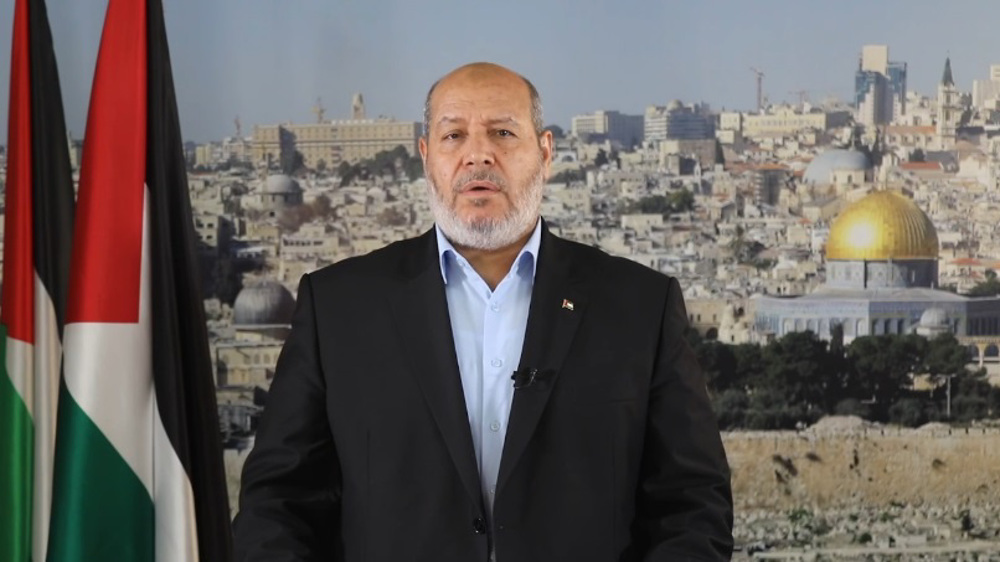Zarif says US can’t stop Iran-Iraq relations
Foreign Minister Mohammad Javad Zarif says the United States cannot “stop” Iran and Iraq’s mutual relations, reminding that Baghdad has established the ties of its own accord.
Zarif made the remarks to BBC Arabic Television on Monday as he is accompanying President Hassan Rouhani during the latter’s historical visit to the Arab country.
“We have good relations with Iraq. Iraq is our neighbor,” the Iranian foreign minister said, and noted that not even former Iraqi dictator Saddam Hossein’s 1980-88 war on the Islamic Republic managed to separate the two nations, ending the historical, geographical, and even family ties between the countries.
“We have never asked the Iraqis to choose us,” the senior diplomat said. “It is the United States, which is pressuring Iraqis to choose [between Iran and the US],” Zarif stated, and noted that Tehran is not after competing with Washington in Iraq either.
Rouhani is in Baghdad on a three-day trip aimed at solidifying bilateral strategic ties. Earlier on Monday and after arrival, he met with his Iraqi counterpart Barham Salih.
He next met with Iraqi Prime Minister Adil Abdul-Mahdi. The two sides signed five memorandums of understanding for the expansion of bilateral cooperation in various economic and healthcare sectors in Rouhani and Abdul-Mahdi’s presence.
The Iranian president is also slated to meet with Parliament Speaker Mohammed al-Halbusi and a number of prominent lawmakers. He will also make stops at Shia holy sites and meet top Iraqi Shia cleric Grand Ayatollah Ali al-Sistani, who is a major source of influence in the Arab country.
Iran-Iraq Summit, Day 1:
— Javad Zarif (@JZarif) March 11, 2019
Met Pres, PM, Speaker+political & business leaders
Agreed on:
-Inclusive regional security
-No-fee visas
-Connecting railways
-Dredging border river after 43 yrs
-Joint industrial zones
-Energy cooperation
-$20B in trade
-PTA
2 more days; 2 more cities pic.twitter.com/W9wWr8wKNz
Religious ties have played a definitive role in the relations existing between Iran and Iraq, whose holy cities of Najaf and Karbala respectively house the shrines of the First and Third Shia Imams, Imam Ali and Imam Hussein (AS). Every year, millions of Iranians go on pilgrimage to the holy cities, especially during the ceremonies marking the anniversary of Imam Hussein’s martyrdom.
By providing the Iraqi military with military advisory support, the Islamic Republic played a central role in Iraq’s anti-terror battle against Daesh during the Takfiri group’s campaign of bloodshed and destruction in the Arab country between 2014 and 2017.
Commenting on the nature of the visit, Zarif said, “I do not believe that we are here either to take a measure against any country [or] to seek intervention on behalf of Iran with any country.” “Our positions have been very clear, and we called for dialog.”
He asserted that the Islamic Republic maintains a regional strategy called “a stronger region rather than strong countries or strong men in this region.” “We have had enough of strong men, we need a strong region,” he noted.
Separately, Zarif commented on a payment mechanism that European countries have announced to safeguard trade with Iran.
The UK, France, and Germany, three of the European signatories to the 2015 nuclear agreement, issued a joint statement on January 31, announcing the launch of the long-awaited direct non-dollar payment mechanism meant to protect their trade ties with the country in the face of the United States sanctions.
The US left the agreement, officially known as the Joint Comprehensive Plan of Action (JCPOA), last May, defying the fact that it had been ratified in the form of a United Nations Security Council resolution. Washington afterwards returned the sanctions that it had lifted under the accord.
Zarif said the European mechanism alone “does not solve all of Iran’s problems.” Nor does it realize all of Europe’s commitments as a partner to the JCPOA, he added.
He also commented on tensions between the Islamic Republic and Saudi Arabia, saying, “We are prepared for cooperation with Saudi Arabia, but they should acknowledge that their security is tied to ours and our security is tied to theirs.”
Saudi Arabia broke off its diplomatic ties with Iran in early 2016 after protests in front of its Iran-based diplomatic missions against Riyadh’s earlier execution of Sheikh Nimr al-Nimr, a prominent Saudi Shia cleric.
Hamas thanks Iran, Resistance Front following achievement of ceasefire in Gaza
'Capitulation': Israeli officials and media concede Gaza defeat as truce unfolds
'Gaza has won': Social media users react to ceasefire with mix of relief, joy
Iran seeks South Korea’s assistance for AI, fiber-optic projects
VIDEO | Iran's 'Eqtedar' (Power) maneuver
Israel hits HTS military target in Syria for 1st time since fall of Assad
VIDEO | Press TV's news headlines
Israel has slaughtered 13,000 students in Gaza, West Bank














 This makes it easy to access the Press TV website
This makes it easy to access the Press TV website